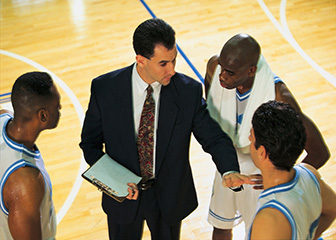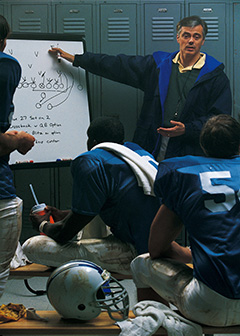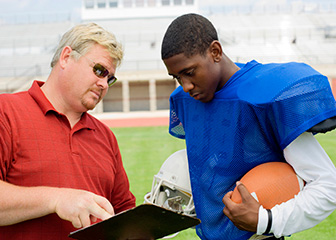Summary

| Quick Facts: Coaches and Scouts | |
|---|---|
| $28,340 per year | |
| High school diploma or equivalent | |
| None | |
| Long-term on-the-job training | |
| 242,900 | |
| 29% (Much faster than average) | |
| 71,400 | |
What Coaches and Scouts Do
Coaches teach amateur and professional athletes the skills they need to succeed at their sport. Scouts look for new players, evaluating athletes’ strengths and weaknesses as possible recruits. Many coaches also scout out new talent.
Work Environment
Coaches and scouts often work irregular hours, including evenings, weekends, and holidays. Full-time coaches usually work more than 40 hours a week for several months during the sports season, and they may be exposed to all kinds of weather conditions. Coaches travel frequently to sporting events. Scouts may be required to travel more extensively when searching for talent.
How to Become a Coach or Scout
Coaches and scouts must have immense knowledge of the game, which they usually get from having played the sport at some level. Although some jobs require a bachelor’s degree, many entry-level coaching positions require only experience from having participated in the sport. Scouting jobs often require experience playing a sport at the college or professional level, which makes it possible to locate young talent.
Pay
The median annual wage of coaches and scouts was $28,340 in May 2010.
Job Outlook
Employment of coaches and scouts is expected to grow 29 percent from 2010 to 2020, much faster than the average for all occupations. Those who are state-certified to teach academic subjects are likely to have the best prospects for getting coaching and instructor jobs in elementary, middle, and high schools. The need to replace coaches who change occupations or leave the labor force also will provide some jobs. Very strong competition is expected for jobs at the college or professional level.
Similar Occupations
Compare the job duties, education, job growth, and pay of coaches and scouts with similar occupations.
O*NET
O*NET provides comprehensive information on key characteristics of workers and occupations.
Contacts for More Information
Learn more about coaches and scouts by contacting these additional resources.











